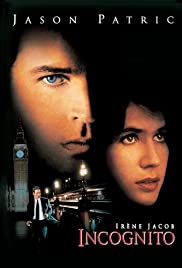
INCOGNITO
US, 1997, 108 minutes, Colour.
Jason Patric, Irene Jacob, Thomas Lockyer, Ian Richardson, Simon Chandler, Rod Steiger, Ian Holm, Dudley Sutton.
Directed by John Badham.
Incognito is another thriller from John Badham. Originally a television director, he moved into mainstream film-making in 1977 with the success of Saturday Night Fever. For the next fifteen years he directed a range of hits, generally action films. He made a Dracula with Frank Langella and Laurence Olivier as well as such films as Stakeout, Bird on a Wire, The Hard Way, American Flyers, War Games, Blue Thunder. On a more serious level he also made Whose Life Is It Anyway.
The film takes place in the world of art forgery with Jason Patric as a surly and angry skilled forger. He has a great admiration for his ailing father, played by Rod Steiger. Irene Jacob plays an art expert who becomes romantically involved and then professionally involved with Patric. There is an uncredited appearance by Ian Holm and Ian Richardson is the prosecuting lawyer. Thomas Lockyer is a suave villain.
The film revolves around Patric painting a false Rembrandt, its being used to sell and make money from Korean art dealers but it is so successful that the entrepreneurs want to put it to auction. Patric disagrees and there follows a conflict which is both violent and ends up in the courts. There is an ironic ending where the villains are defeated and the central characters win out.
The film received limited release but it is a reasonable action entertainment with a touch of art and intelligence, given its art world setting.
1. Popular intrigue and action thriller? Characters? Dangers? The art world and the world of forgery?
2. The international flavour of the film, the sequences in Paris and the use of the city, the coast of Spain, New Jersey, the bulk of the action taking place in Britain, the city, the countryside? Authentic atmosphere? The musical score?
3. Art forgery, its prevalence, entrepreneurs making money, buyers? The rackets, the possibilities for deceit? The forgers themselves, whether to sign their names, the artists’ names or appear incognito?
4. The plausibility of the plot, Harry and his skills, his being influenced by his father, his resentments, wanting to measure up? The deals, hard-boiled language, wanting the money? When asked about feelings towards a painting, unable to reply? His big fees? The admiration of people in the art world, the world of forgery? The testimonials? John and his urging Alistair Davies to go to Harry? The proposition, his decision to paint the Rembrandt?
5. The painting of the Rembrandt, the careful preparation of all the paints and chemicals? The range of study? The actual painting? Going to Spain, setting up to be discovered in a Spanish cellar? The dealers, their pretence, suggesting it was a Spanish artist, the experts all claiming that it was a Rembrandt? The consequences for Harry? Davies and his decision to go to auction to make more money?
6. Harry, in Paris, Marieke and her spilling the coffee, the discussion about the book, the irony that she and her father were the authors? His offhand manner about the book, about intellectuals? Her taking him to meet experts and his insulting them? Her pursuing him, the attraction, the affair, her note – and its being used in court? Her turning up to verify the Rembrandt, her decision that it was a fake and the reasons given?
7. Harry, in England, the discussions with Davies, the shooting, the death of the Korean, his being accused of murder? Of stealing? The encounter with Marieke, her wanting to expose him, his bargain with her, the handcuffs, taking her on the train, getting off, the phone box and her attempt to escape? Her gradually believing in him? His going to the art school, the discussions with John, Davies and his associates present? The police and the interrogations (the previous interrogations in the pub and his escape with the painting)? His arrest?
8. His relationship with his father, their discussions about his art, his forgeries, not having his own style? His father’s illness, the phone call, death? Davies showing him the press clipping about his father’s death?
9. In prison, the discussions with the visitors, in court, the prosecutor and his harsh stance, the role of the defence? The judge? The issue of the shooting, the issue of the painting? His decision, with Marieke, to demonstrate his abilities? The painting, seeing his father’s eyes, not being able to go on?
10. Davies and his hold over Iain Ill, Ill going into the stand, revealing the truth about Davies and the shooting? His being let off?
11. The auction, the people bidding for the Rembrandt? Fifty-five million? Ill and his party, speech, toast? The irony of his lawyer coming, Harry and the letter that he sent to the man in Spain, the claim that the painting was his because it was in his cellar? The money going to the Spanish government, the church, to the man in Spain – and his giving half to Harry?
12. Justice being seen to be done – Harry and his portrait of Marieke, asking her how she felt about it? A neat and pat ending to the action thriller?